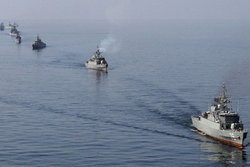 The Trump administration has backtracked on its earlier bid to build a military coalition in the Persian Gulf to counter what it called the “Iran threat”, saying now that the coalition is not aimed at countering the Islamic Republic.
The Trump administration has backtracked on its earlier bid to build a military coalition in the Persian Gulf to counter what it called the “Iran threat”, saying now that the coalition is not aimed at countering the Islamic Republic. RNA - A top Pentagon official told Reuters on Thursday that the US Persian Gulf maritime proposal is not supposed to be a military coalition against Iran.
“This is not a coalition against Iran ... If you were militarily confronting Iran, this is not the construct that you would use,” said Kathryn Wheelbarger, one of the most senior policy officials at the Pentagon.
Wheelbarger, who briefed NATO allies this week on the US proposal, said the coalition is simply aimed at “shining a flashlight” in the Persian Gulf to deter attacks on commercial ships.
“Just shining a flashlight on something - that’s all we’re asking people to do, quite frankly.”
According to the senior official, the coalition is to be less operational and more geared toward increasing surveillance capabilities.
“The goal is to increase maritime domain awareness and surveillance capabilities in the region to dissuade malign action,” she explained.
Her remarks are seen as another flip-flop in the policies of the Trump administration, as the US military’s top general had said a few days ago that Washington engaged in talks with a number of countries to form a military coalition to deter what it calls Iran’s threat to shipping in the Persian Gulf region.
Allies reluctant to join US initiative
Six sources familiar with the matter said the United States is struggling to win its allies' support for the initiative to heighten surveillance of the vital Middle East oil shipping lanes because of fears it will increase tension with Iran.
Because of fears of confrontation with Iran, any involvement by Washington's allies is likely be limited to naval personnel and equipment already in place - near the Strait of Hormuz in the Persian Gulf and the Bab al-Mandab strait in the Red Sea, two Persian Gulf sources and a British security source said.
"The Americans want to create an 'alliance of the willing' who confront future attacks," a Western diplomat said. "Nobody wants to be on that confrontational course and part of a US push against Iran."
A French official told Reuters that France, which has a naval base in the United Arab Emirates, does not plan to escort ships and views the US plan as counterproductive to easing tensions because Tehran would see it as anti-Iran.
The British security source said it was not viable to escort every commercial vessel, a view shared by several other countries.
China and Japan are also unlikely to join such a maritime coalition, sources told Reuters.
US Marine General Joseph Dunford, chairman of the Joint Chiefs of Staff, said on July 9 that the US was proceeding with plans to assemble the coalition purportedly aimed at ensuring freedom of navigation in waters off Iran and Yemen.
"We're engaging now with a number of countries to see if we can put together a coalition that would ensure freedom of navigation both in the Straits of Hormuz and the Bab al-Mandab," Dunford said.
"And so I think probably over the next couple of weeks we'll identify which nations have the political will to support that initiative and then we'll work directly with the militaries to identify the specific capabilities that'll support that," he added.
Several oil tankers were suspiciously targeted near the Persian Gulf last month, with Washington and its ally Saudi Arabia quickly blaming Iran for the suspicious attacks. However, Iran has denied all the charges.
847/940